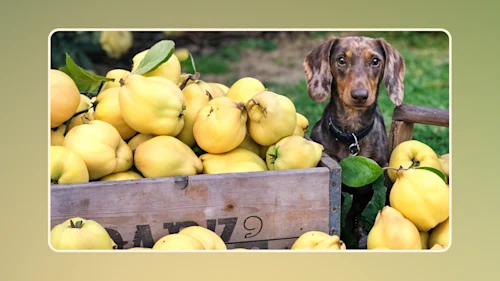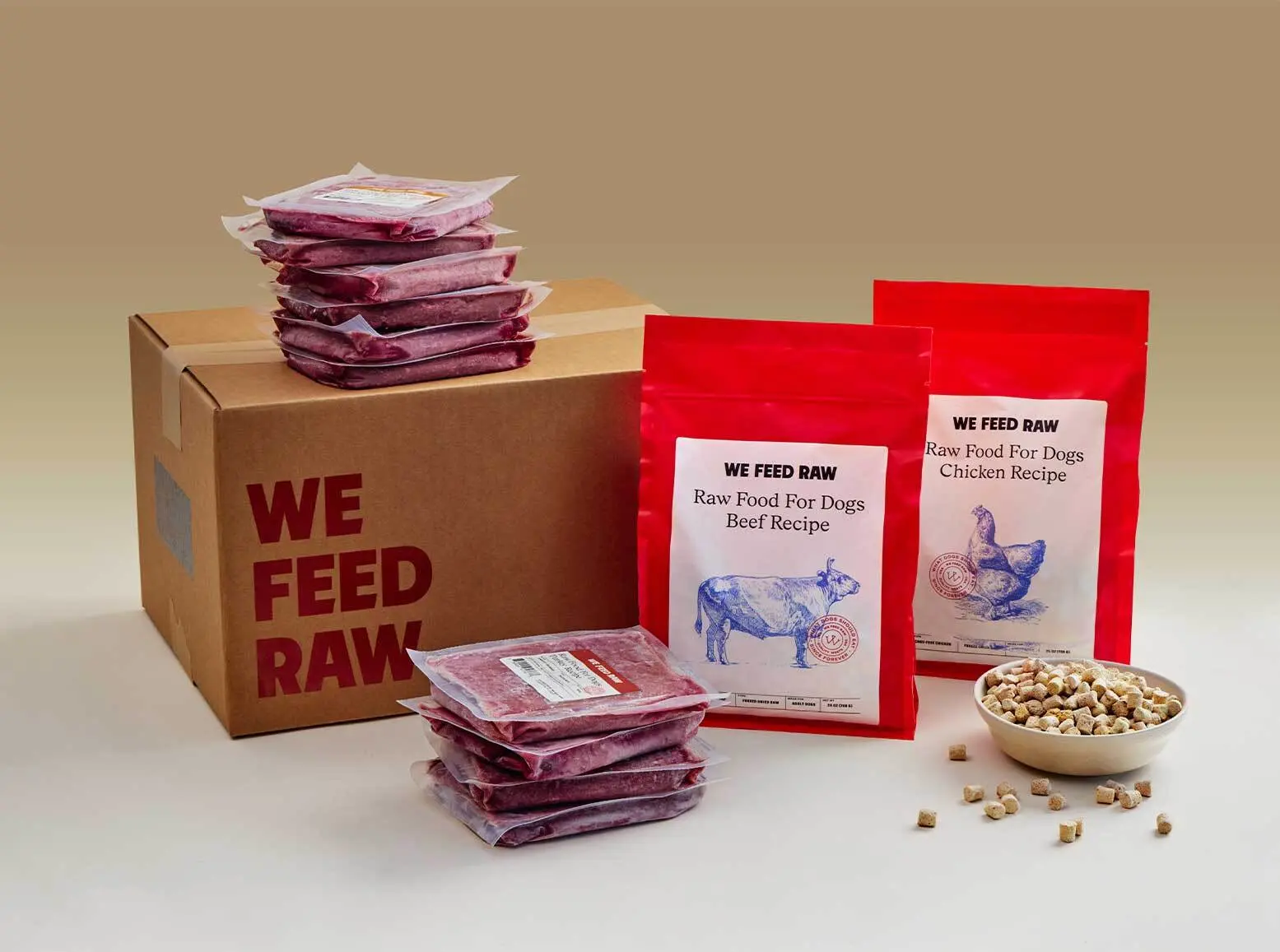
Do Dogs Eat Fruits? Safe Options for Your Pooch
Table of Contents
- Do Dogs Eat Fruits? Introduction to Fruits in a Dog's Diet
- Can Dogs Eat Fruit?
- Which Fruits Can Dogs Eat?
- Is Fruit Good for Dogs? Nutritional Benefits Explained
- How to Prepare Fruits for Dogs
- What Fruits Can Dogs Not Eat?
- Understanding Fruit Portions for Dogs
- What Should I Do If My Dog Eats Something Toxic?
- Pet Poison Hotlines
- Can Dogs Eat Raw Meat?
- Frequently Asked Questions (FAQs)
- Better Than Fruit for Dogs: We Feed Raw
You only want to feed your pup the best, so you may be wondering: Do dogs eat fruits? The short answer is that yes, dogs can eat small amounts of most fruits (with a few toxic exceptions). Too much fruit can be bad for your dog’s stomach or waistline, but a little bit of fruit from time to time makes for an excellent snack.
Here’s everything you need to know about dogs eating fruit as part of a nutritious diet.
Do Dogs Eat Fruits? Introduction to Fruits in a Dog's Diet
Dogs are facultative carnivores, meaning their bodies are designed to get all their nutrients from muscle meat, organ meat, and bone, but they do have some ability to digest plant matter. While dogs don’t NEED to eat fruits as part of their diet, they CAN have fruit as an occasional snack.
Can Dogs Eat Fruit?
Yes, dogs can eat small amounts of most types of fruit. Some fruits (like grapes, raisins, and avocados) can make dogs sick and should be avoided, but the flesh of most other fruits is safe for dogs in small amounts. Note that fruit is high in sugar, so dogs shouldn’t eat too much fruit, and dogs that are obese or have diabetes might be best to avoid fruit altogether.
Which Fruits Can Dogs Eat?
Fruits that are safe for dogs (in moderation) include:
•Apples
•Bananas
•Blackberries
•Blueberries
•Cantaloupe
•Cranberries
•Cucumbers
•Honeydew
•Mangoes
•Oranges
•Peaches
•Pears
•Pineapple
•Pumpkin
•Raspberries
•Strawberries
•Watermelon
Is Fruit Good for Dogs? Nutritional Benefits Explained
While dogs don’t need fruit in their diet (especially if they’re eating a nutritionally complete and balanced raw diet), fruits can add bonus nutrients and be fed like treats to add some tasty variety to their diet. Here are a few especially beneficial fruits for dogs.
Blueberries
Full of fiber and antioxidants, fresh or frozen blueberries are also the perfect size to use as training treats.
Cucumbers
Although they’re green, cucumbers are, in fact, fruits rather than vegetables, and they make an excellent treat for dogs since they are low in calories and chock-full of vitamins.
Pineapple
Fresh pineapple (not canned, since the juice adds too much sugar) is a great snack for dogs since it’s rich in zinc, phosphorus, calcium, and other vitamins and minerals.
Watermelon
Since it’s 92% water, watermelon is one of the best fruits you can share with your dog, especially on a hot summer day. Just be sure to remove the seeds and rind first, since those can cause intestinal blockages.
How to Prepare Fruits for Dogs
Always remove seeds, pits, cores, peels, and rinds before feeding fruits to your dog. Also, be sure to stick with fresh or frozen fruit, since canned, jarred, and other fruit preparations often contain added sugar that’s even worse for dogs than it is for us humans.
What Fruits Can Dogs Not Eat?
Some fruits can make dogs very sick. The worst offenders are grapes and raisins. Scientists still aren’t sure why, but as little as a single grape or raisin can make a dog extremely sick or even kill them. Other fruits dogs should avoid include:
•Avocado, which contains persin, a toxin that can cause vomiting and diarrhea in dogs.
•Cherries, because the pits contain cyanide which can make dogs sick.
•Tomatoes; while the ripened fruit is likely OK in small amounts, all green parts of the plant contain toxic solanine, so be sure to keep your pup away from tomato plants in gardens.
Understanding Fruit Portions for Dogs
All treats and snacks that aren’t part of your dog’s regular meal should account for no more than 10% of their daily calories, so keep that in mind when sharing fruit with your dog. Large dogs can eat more fruit than small dogs, but a general rule of thumb is to give your dog no more than a few bite-sized pieces of fruit per day.
Since fruit is high in sugar, it can lead to anything from an upset stomach to obesity, so never go overboard when sharing fruits with your dog.
What Should I Do If My Dog Eats Something Toxic?
Dogs tend to get in the trash, eat random stuff on walks, or even counter-surf to eat things they shouldn’t. Any time your pup eats something they shouldn’t, you should always contact your veterinarian or a pet poison hotline right away and find out what to do. You might be told to simply keep an eye out for symptoms, how to make them throw up the item they shouldn’t have eaten, or to bring your dog to the vet right away for treatment.
When it comes to toxic foods or intestinal blockages, time is always of the essence, so never hesitate to reach out sooner rather than later. It may save your dog’s life.
Symptoms of Poisoning in Dogs
Sometimes, dogs may eat toxic foods without us noticing. These symptoms indicate your dog may have eaten something toxic, and you should contact a veterinarian immediately if your dog shows:
•Drooling or foaming at the mouth
•Lethargy
•Vomiting
•Diarrhea
•Constipation
•Twitching or seizures
•Standing with a hunched back
Pet Poison Hotlines
There are two pet poison hotlines available 24/7 if your pup eats something they shouldn’t:
•Pet Poison Helpline: (855) 764-7661
•ASPCA's Animal Poison Control Center: (888) 426-4435
Can Dogs Eat Raw Meat?
Now that you know that dogs can safely eat most fruits in small quantities, have you ever thought about what they SHOULD be eating the rest of the time? A species-appropriate raw diet is the best thing you can feed your dog. Learn more about why raw is the best food for dogs here or take our quiz here to find out how much it would cost to get your dog started on life-changing raw nutrition.
Frequently Asked Questions (FAQs)
Can dogs eat fruit?
Yes, dogs can eat small amounts of most types of fruit. Dogs should never eat grapes, raisins, cherries, avocados, or tomatoes, and you should not feed your dog the seeds, pits, peels, or rinds from fruits. Also, make sure that fruit and other treats make up no more than 10% of your dog’s overall diet.
Which fruits are safe for dogs to eat?
Most fruits are safe for dogs to eat apart from grapes, raisins, cherries, avocados, and tomatoes. Only feed your dog small amounts of fruit since it’s high in sugar, and don’t feed your dog seeds, pits, stems, or peels.
Can dogs eat fruit snacks?
No, dogs should not eat fruit snacks because they are very high in sugar.
Better Than Fruit for Dogs: We Feed Raw
Ready to make sure your furry friend gets all the benefits of a nutritious diet without the worry of accidentally feeding them harmful fruits? We Feed Raw is here to help! Our raw meal plans are expertly designed to fit your dog's specific needs, providing all the essential nutrients from muscle meat, organ meat, and bone, minus the risky guesswork.
With WeFeedRaw.com, you'll have peace of mind that your dog is not only consuming a species-appropriate diet but also enjoying benefits like smaller poop, less gas, and shinier fur. Our service ensures that every meal is balanced and safe, allowing your companion animal to thrive on a diet that's tailored to their carnivorous biology.
Why stress over the dos and don'ts when We Feed Raw can deliver perfection to your doorstep? Our commitment to your dog's health is just a click away. Visit WeFeedRaw.com now and discover the path to a happier, healthier life for your pup with meals that are as delicious as they are nutritious. Get started today and watch your dog thrive!

Our Meals Change Lives.
(Theirs + Yours.)
See health improvements from our raw meals in as little as 1 week.
